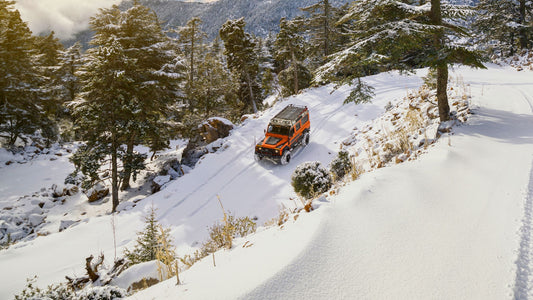Overlanding is a type of travel that has recently become popular among adventure-seekers and nature enthusiasts. It involves traveling to remote or off-road destinations using vehicles specifically designed for the rough terrain. Overlanding offers a unique opportunity to explore new places, disconnect from technology, and connect with nature. In this post, we'll explore the benefits of overlanding and why you should try it.
BENEFITS OF OVERLANDING

-
Explore nature and new places
One of the biggest benefits of overlanding is the opportunity to explore remote or off-road destinations that are otherwise inaccessible. You can experience the beauty of nature and get away from the hustle and bustle of city life.
-
Encourages independence and self-reliance
Overlanding requires a certain level of independence and self-reliance. You'll need to be prepared for any situation, from mechanical breakdowns to getting lost. This can be a great opportunity to build confidence and problem-solving skills.
-
Opportunity to disconnect from technology and enjoy solitude
In today's world, it's easy to become addicted to technology and constantly connected to social media. Overlanding offers the opportunity to disconnect from technology and enjoy some solitude in nature. This can be a great way to recharge and reset.
-
Builds camaraderie and community among fellow overlanders
Overlanding is a community-driven activity. You'll meet other overlanders on the road, and there's a strong sense of camaraderie among those who share this passion. This can be a great way to make new friends and build a support network.
-
Promotes physical and mental health
Overlanding involves physical activity and exposure to nature, both of which have been shown to have positive effects on mental and physical health. It's a great way to get some exercise, reduce stress, and improve your overall well-being.
HOW TO GET STARTED
If you're interested in trying overlanding, here are some tips to help you get started:
-
Equipment
You'll need a vehicle that's capable of off-road travel, as well as camping gear and other supplies. Make sure you have everything you need before you set out on your trip.
-
Planning and preparation
Overlanding requires careful planning and preparation to ensure a successful trip. This includes researching your route, checking weather and road conditions, and making sure you have enough food and water.
-
Safety
Overlanding can be dangerous, especially if you're traveling in remote areas. Make sure you have a first aid kit, a satellite phone or emergency beacon, and other safety equipment to keep you safe.
PERSONAL EXPERIENCES
As an overlander myself, I can attest to the many benefits of this type of travel. I've had the opportunity to explore some truly amazing places, meet interesting people, and build confidence and self-reliance. Overlanding has also had a positive impact on my mental and physical health, helping me to stay active and reduce stress.
CONCLUSION
Overlanding is a unique and rewarding way to travel, offering the opportunity to explore remote destinations, connect with nature, and build camaraderie with fellow overlanders. If you're interested in trying overlanding, start by doing your research, planning your route, and preparing for any situation. With the right equipment and mindset, overlanding can be a truly transformative experience.




